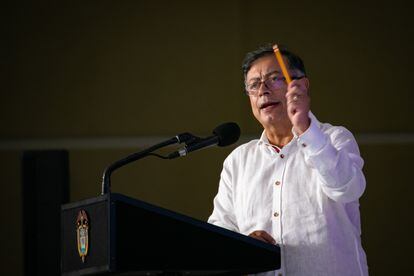Gustavo Petro during the National Congress of ACOPI. Government of Colombia
"The truth is that the interest rate has grown, that globally then we have a recession in sight, and that the increased interest rate in Colombia will serve as a transmission belt of the world recession within the Colombian economy."
Those words by President Gustavo Petro this Thursday at the annual congress of ACOPI, the association of small industrialists, are not only a strong economic alert but also a new criticism by the head of state of the board of directors of the Banco de la República, which at the end September raised interest rates to 10%.
So far, technical forecasts point to a major slowdown in economic growth but not necessarily a recession, which technically occurs when a country's GDP falls for two consecutive quarters.
Usually the analyzes refer to a full year, not to its quarters, and they do show that GDP will grow much slower in 2023. The International Monetary Fund revealed on Tuesday that it expects the country to grow 2.2% next year.
The Banco de la República forecasts just 0.7%.
Other analysts foresee something similar: those consulted by the Fedesarrollo think tank for its most recent monthly survey of financial opinion, that of September, foresee a growth of between 1.8% and 2.9%.
The president's statements land these forecasts in an even more negative terrain than that of the slowdown, such as the recession.
Something similar, although less alarming, says President Joe Biden for the United States.
“I don't think there is a recession.
And if there is, it will be small.
I mean, we're going to back down very little," he said Tuesday, he said in an interview with CNN.
He does so when technically the country has already entered a recession in July and when its central bank raises reference interest rates, as the Banco de la República has done in Colombia.
Petro, in addition, reinforces his criticism of the board of directors of the central bank, which he has been lashing out since the presidential campaign.
In an electoral debate he suggested that the board should be made up of sectors of civil society, unions and unions.
He also criticized the board when, at the end of 2021, it began raising its rates to curb inflation.
As president, he has maintained that same line.
The previous Wednesday, when it became known that September's inflation marks the highest of the century, he used his popular Twitter account to argue that raising the interest rate does not manage to curb the shortage but it does affect economic growth, and propose a tax on the swallow capitals.
His finance minister and member of the Bank's board of directors, José Antonio Ocampo, later clarified that the idea of such a tax is ruled out.
But the president has a clear vision, even if he does not speak more about imposing this tax.
At the ACOPI congress this Thursday, he repeats the argument against raising rates: “The Banco de la República has raised rates from 1.75% to almost 10% in one year.
Will this allow growth, will it allow reactivation, for the popular economy to flourish, for large companies to develop in Colombia?
No. Will it allow us to overcome hunger, reduce social inequality, and allow thousands of Colombians who don't have a job to have one?
Nope".
According to the minutes of its September meeting, only one member of the board of directors of Banco de la República (names are not revealed, but the arguments and positions are not revealed) sees the possibility of a decision with great concern, and voted to increase only 0 .5% rates.
The remaining 6 tend more to prioritize the fight against inflation.
"The Board is aware that said adjustment requires weighing the prospect of a slowdown in economic activity with that of inflation that continues to be far from the target," says the text.
It remains to be seen if they change their minds, or moderate their positions, due to the president's statement that a recession is coming on behalf of the board.
Meanwhile, this Thursday the peso is once again approaching its historical price low against the dollar, which it reached the day after Petro's previous criticism.
Subscribe here
to the EL PAÍS newsletter on Colombia and receive all the key information on the country's current affairs.

